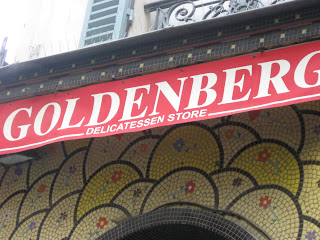Our first visit today was with the OCED Nuclear Energy Agency to talk about the organization and the events in Fukushima. The OCED was originally formed from the U.S. Nuclear Regulatory Commission as the Organization for Economic Cooperation and Development. It was formed as part of the Marshall Plan to rebuild Europe after WWII. The official languages of the OCED are English and French. Currently France is powered by almost 80% nuclear, Japan 30%, and the U.S. 20%. The staff of 80 people produces about 60 publications per year regarding nuclear energy, and also do legal work on nuclear liabilities.
On March 11 there was an earthquake in Japan. The nuclear plant operation in Fukushima stopped and emergency power came on, but the tsunami caused a total blackout. Emergency measures prevent fuel leakage, but having power is necessary to use these measures. The fuel melted through the structure and hit the reactors, causing the explosion. Seawater was brought in to cool the reactors, but it also corrodes them which means the plant is ruined and can't be used. Fukushima is still experiencing structural and radiation damage; the radiation had leaked into the water but the amount is considered minor. After Fukushima, Germany shut down seven of its older plants due to public political backlash.
Some place should not invest in nuclear because they can't be designed to withstand certain natural disasters. The U.S. currently has 64 nuclear sites, and has been adding generators to existing sites rather than build new ones. The U.S. is now building a new nuclear site for the first time in 30 years, in Georgia. Before Fukushima, Japan had planned to go to 50% nuclear and now that plan has been dismissed. They will maintain 30% and work on efficiency and renewable energy instead.
Our second presentation for the day was with another energy agency. The International Energy Agency (IEA), and our presenter was the Executive Secretary of Directors Richard H. Jones. The mission of the IEA has been to promote energy security since the 1973 oil embargo. It was set up for countries that were already members of the OCED. They focus on 4 E's:Version: energy security, economic growth, environmental sustainability, and global engagement. Participating countries must be democratic, must have a developed economy, and must have 90 days worth of oil in stocks. The IEA monitors and reports on oil and gas markets and provides emergency response. For example, they were forced to use these oil stocks in 1990 when Sadam invated Kuwait and in 2005 after hurricanes Rita and Katrina.
Environmental sustainability can be achieved through low-carbon solutions like energy efficiency, carbon capture and storage, and renewable resources. Energy is #1 in creating emission so it needs to be reformed. By 2050 the goal for energy is 25% nuclear, 25% carbon capture and storage, and 50% carbon-free renewable energy. The EU has passed energy efficiency policies that finance projects through public-private partnerships to reduce the loan interest for retrofitted buildings. Passive energy houses are completely self-sufficient by perfectly insulating the building and powering it with solar power. The technology to reduce emission by 90% has been available since 199. It is a new EU requirement that all buildings be properly insulated, which is important because 20% of the buildings in Paris are inefficient because they are from the 19th century.
Another energy efficiency idea is to have mandatory energy performance requirements or labels listing efficiency and scoring it. Also for appliances to have low standby power regulations of no more than 1 watt per hour. These methods are very cost effective, and products that don't comply will be publicly noted and eventually pushed out of the market. Since 2008 Energy Star ratings have saved the U.S. 20 billion. Soon incandescent light bulbs will be phased out and replaced by more efficient LED or CFL lights.
Transportation can also be made more energy efficient with something even as small as having the correct tire pressure in the tires on your car. People in Europe practice eco-driving, where they switch gears less often and cut the engines at red lights (not possible in automatics). Minimum energy performance standards ought to be set for motors.
After spending the day learning about energy, I took a walk with my professor Dr. Hansen down to the old Jewish quarter located on the Street of Roses. A shop named there named Goldenberg's Deli is famous for being bombed by Arabs; it's a clothing store now, but the original sign was left up on the building in memory of the event. There was also a plaque on the street apologizing for the roundup and deportation of the French Jews to Auschwitz. I left the Jewish quarter and had dinner at a creperie (I love crepes!) before getting to bed early.
Peace, Love, and Paris ~ Naomi
Pictures of the Day
Eclair at lunch
Street of Roses in Jewish Quarter
In memory of the Holocaust
Deli that was bombed in the 70s
Jewish people hanging out
Fountain in the park









No comments:
Post a Comment